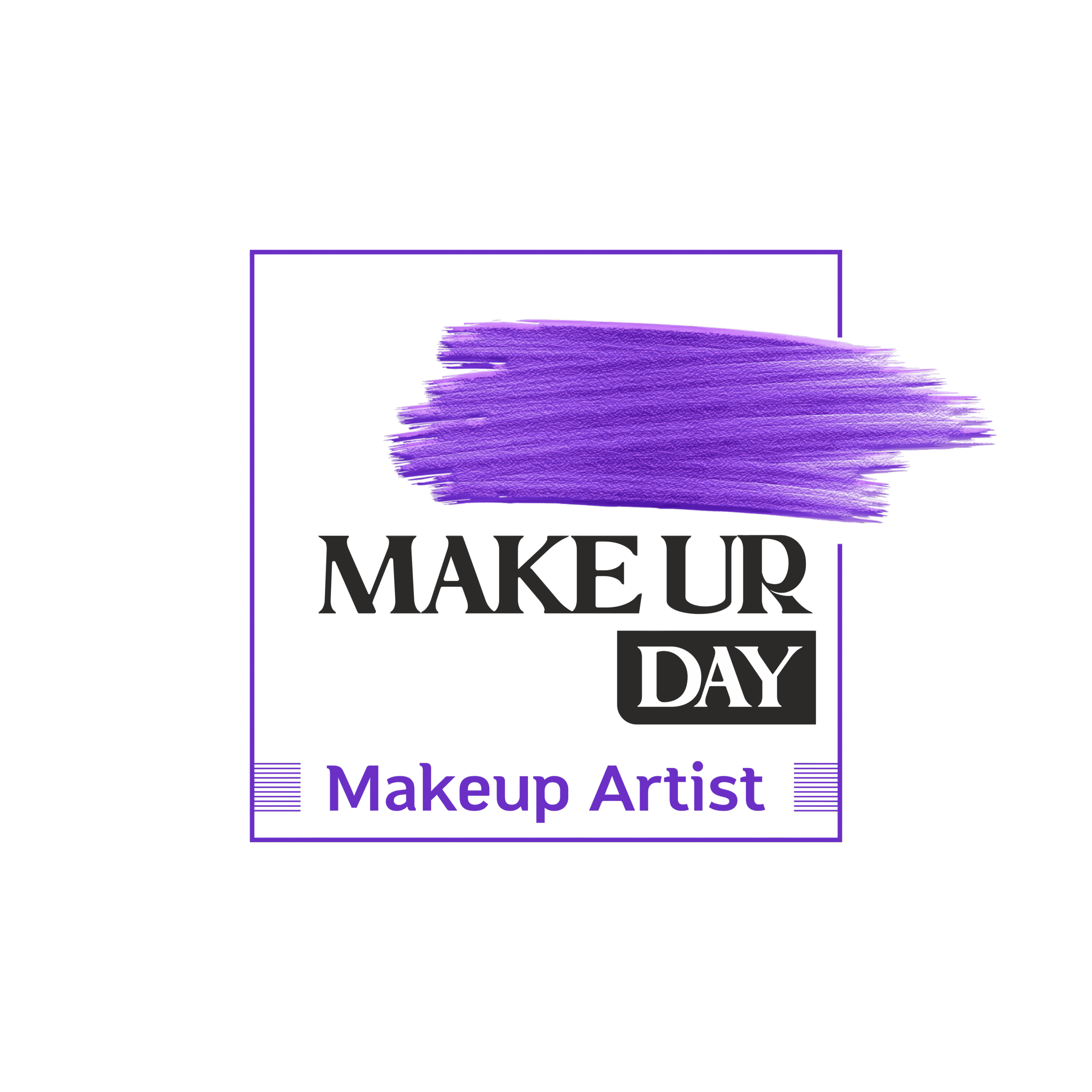What Makeup Tools Every Beginner Should Own
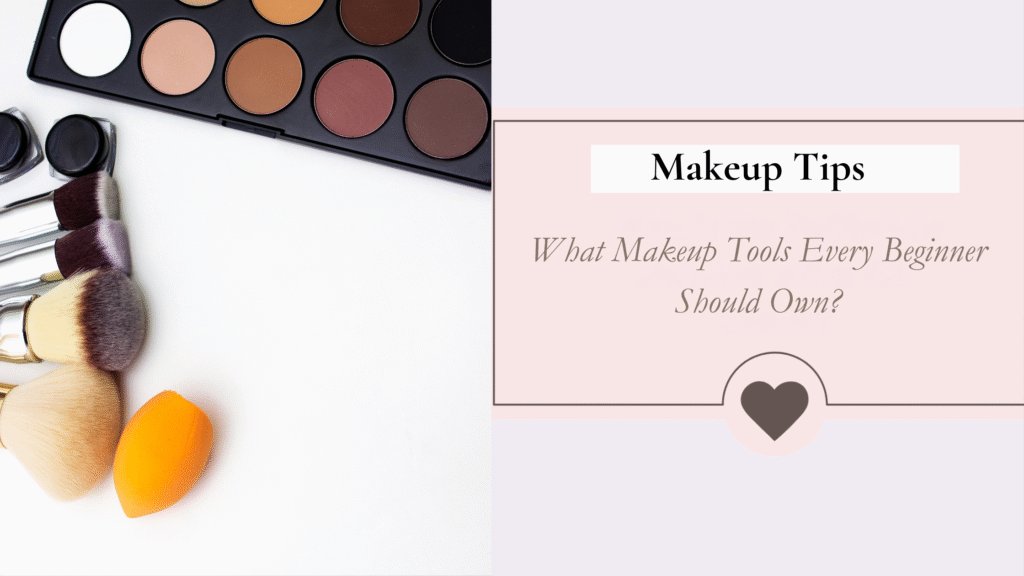
It is quite easy to become confused when you start the process of doing your makeup, as you have a lot of brushes, sponges and makeup tools on the market. Nevertheless, beginners do not require an enormous set to make a stunning make-up appearance. Few basic tools are needed to put on makeup effortlessly, blend perfectly and maintain good hygiene. The guide discusses the essential makeup items that every beginner must possess, their importance and how they will make you look professional despite being new to makeup. 1. Make-A-Wish Foundation Sponge or Beauty Blender One of the most useful beginner makeup tools is a foundation sponge. It makes the application of liquid foundation, BB cream, concealer and even cream blush a smooth process. The sponge can also be used wet, and one can apply the product onto the skin with a natural and airbrushed finish. A sponge is more tolerant and convenient to work with as opposed to the brushes that leave streaks. It is also perfect for touch-ups and softening of harsh lines, hence a must-have in the kit of a beginner. 2. Face Brush foundations (Powder, Blush and Contour) Although sponges are ideal when using cream products, beginners also require a couple of face brushes. A powder brush is used to fix the makeup and remove unnecessary shine. A blush brush puts the color on the cheeks in a natural way and does not appear patches. Beginners can soften and shape their face naturally with the help of a contour or angled brush. Having a few good quality face brushes will be enough to achieve a smoother application and a better control over product placement, making your makeup look finished and blended. 3. Eyeshadow Brushes Easy eye make-up Beginners do not require a huge set of brushes used in eyeshadow; only two brushes are necessary: a flat shader brush and a blending brush. The eyelid color is applied to the eyes with no fallout and diffused at the edges, resulting in a soft and natural eye feel, using the flat brush. These two brushes can be used to achieve simple daily glam or subtle glam on a special occasion. They are simple to apply, user-friendly and necessary for those who are learning how to apply eye makeup. 4. Mascara Wand and Eyelash Curler An eyelash curler will immediately bring the lashes up, open up the eyes and make you look fresh and awake even without a lot of make-up. It works together with a mascara wand to increase the length, volume and expression of lashes. A lot of beginners do not appreciate the fact that an eyelash curler can help you look better in a matter of minutes, yet it is among the easiest tools that can instantly improve your appearance. Use a curler, which has a comfortable handle and a pad that is soft that will not drag or destroy lashes. 5. Grooming Thumbs Tweezers and Makeup Scissors Makeup tools are as important as good grooming tools.Use tweezers to clean up stray eyebrows and keep them neatly in place, whereas mini makeup scissors are used to safely trim false lashes or hair on the brows. Such tools guarantee that your make-up is well-placed, since a well-groomed eyebrow region will make any eye make-up to seem cleaner and more articulate. Beginners are advised to have these tools at all times in their make-up bag in case of a need to do quick repairs and touch-ups. Conclusion You do not have to use a massive professional kit to begin your makeup trip, a few basic tools can change a lot. A foundation sponge, basic face brushes, essential eye brushes, eyelash curler, and basic grooming tools are all one requires to apply smoothly, perfectly blend, and get a refined look. You can also include additional tools in your assets as you become more comfortable with the practice. These beginner-friendly essentials will help you get beautiful results easily, comfortably, and confidently, at least until you get more experience.
Lipstick Shades That Flatter Every Indian Skin Tone
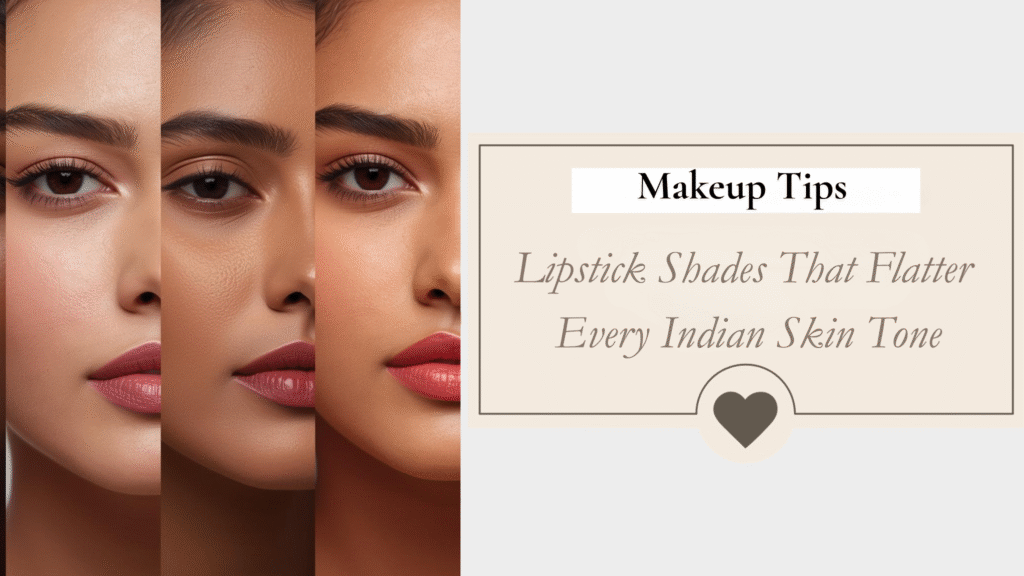
The right shade of lipstick can make your whole face on point in a second. However, with the abundance of services in the market, it can be so easy to get lost. The skin toning of Indians is really lovely as it has fair, cold, and neutral shades. To strike the right lipstick color, it is not about keeping up with what’s popular on the market, but rather, knowing what suits your own complexion really well. This guide will discuss the lipstick shades for Indian skin tone and will make you feel confident and radiant. 1. Nude Shade Lipstick for Indian Skin. Nude lipsticks are one of the lipstick shades for Indian skin tone. However, when they are not the right nude, it fades away Indian skin. Rather than the paler beige colors, use peachy nudes, rosy browns, caramel nudes, and pink-brown colors. These colors would add natural lip color and match most of the Indian undertones. Any nude can easily be sophisticated whether you are heading to the office or you are willing to appear with bare minimum makeup. 2. Classic Red Lipstick for Indian Skin That Never Fail Timeless, red lipstick is also all-universal as long as you use the right undertone. Warm reds, brick reds, cherry reds, and deep wine reds are very beautiful on Indian skin tones. These colors make the event glamorous and suit perfectly during a wedding, party, and festivals. Red is a good color that makes a good match with traditional and western clothing and makes the face bright. 3. Pink Shades in a Fresh and Youthful Look. Pink lipsticks can be applied on soft natural-looking makeup. Rose pinks, dusty pinks, mauve pinks and warm coral pinks are the most appropriate colors to match Indian skin tones as opposed to neon pinks and very pale pinks. These hues are refreshing for the face and best suited during the day or for casual outings or low-key bridal looks. 4. Berry, Plum and Wine Bold Beauty Shades. Berry, plum, burgundy, and wine colors are also good options for those who love statement lip colors. These shades are an improvement on medium and deep Indian skin tones, but they do not overwhelm the appearance. They are particularly complimentary to nighttime, winter style and daring bridal fashion. 5. Everyday Glow, Coral & Peach Shades. Coral and peach lipsticks add some warmth and liveliness to Indian skin. Peachy pinks, soft corals, and warm orange-based colors do well in summer and as daily makeup. These tones make a healthy and radiant look and match with less eye make-up and a fresh skin appearance. Conclusion The right shade of lipstick can turn around your make-up and give you some sense of confidence and the best shade of lipstick is one that suits you and makes you feel good. Indian skin tones are copious and rich with choices to use, whether flattering nudes or choice of reds, fresh pinks and bold berry tones. It is not something to be scared of trying things out, combining finishes, and discovering colors that reflect your personality. Nonetheless, confidence is the most complimentary color to wear.
The Benefits of Using Eye Primers for Bold Eyeshadows

It may sound like a cliché, but one of the first things people notice about anyone is their eyes. While naturally beautiful eyes are stunning on their own, making them pop can elevate your look even more. However, achieving that striking effect isn’t always easy. It requires proper preparation, because even the most pigmented eyeshadows can fade, crease, or smudge after just a few hours. And we definitely don’t want that, do we? That’s where an eye primer comes in—it helps your eye makeup stay flawless, vibrant, and long-lasting. Using it can make a huge difference in your routine, ensuring eyeshadows stay bold and stunning all day. Today, I will go in depth about the Benefits of Using Eye Primers for Bold Eyeshadows. 1. Enhances Color Payoff One of the biggest benefits of eye primer is that it enhances the vibrancy of your eyeshadows. Bold shades like electric blues, deep purples, and neon pinks can sometimes appear muted on bare eyelids. Eye primers create a smooth, even base that allows pigments to adhere better, giving you a more true-to-pan color payoff. 2. Prevents Creasing and Smudging Eyeshadow tends to crease or smudge when applied directly to natural eyelids due to oils and moisture. Eye primers help by creating a barrier between your skin and the eyeshadow. This barrier absorbs excess oils, stabilizes the powder, and prevents it from sliding into the eyelid creases. This means your bold looks stay flawless for longer periods, even in humid conditions. 3. Improves Longevity Eye primers significantly extend the wear time of eyeshadows. Without a primer, shadows may start fading within a few hours, especially bright or shimmery shades. A good primer locks the eyeshadow in place, keeping your makeup intact from morning to night. This is particularly useful for events, parties, or photoshoots where you want your look to last. 4. Creates a Smooth Canvas Uneven skin texture or discoloration on the eyelids can affect the final look of eyeshadow. Eye primers even out skin tone and smooth fine lines, providing a perfect canvas for makeup application. This makes blending bold colors easier and helps achieve a more professional finish. 5. Reduces Fallout Bold eyeshadows, especially powders, are notorious for fallout during application. Applying a primer helps the pigment stick to your eyelids instead of falling onto your cheeks. This means less cleanup and a cleaner, more precise look. 6. Allows for Creative Freedom When you know your eyeshadow will stay in place, you can experiment with bolder, more creative looks. From cut creases to glitter accents, primers provide the stability needed to try advanced techniques without worrying about smudging or fading. Conclusion Using an eye primer may seem like an extra step, but it is a game-changer for bold eyeshadows. It boosts color intensity, prevents creasing, extends wear time, smooths the eyelid canvas, and minimizes fallout. Whether you’re a makeup beginner or a professional artist, Makeur Day, as the best makeup artist in Vijayawada, can help you choose the right eye primers and techniques to elevate your bold eyeshadow game.
Best Makeup for Indian Skin: Everything you Need to Known
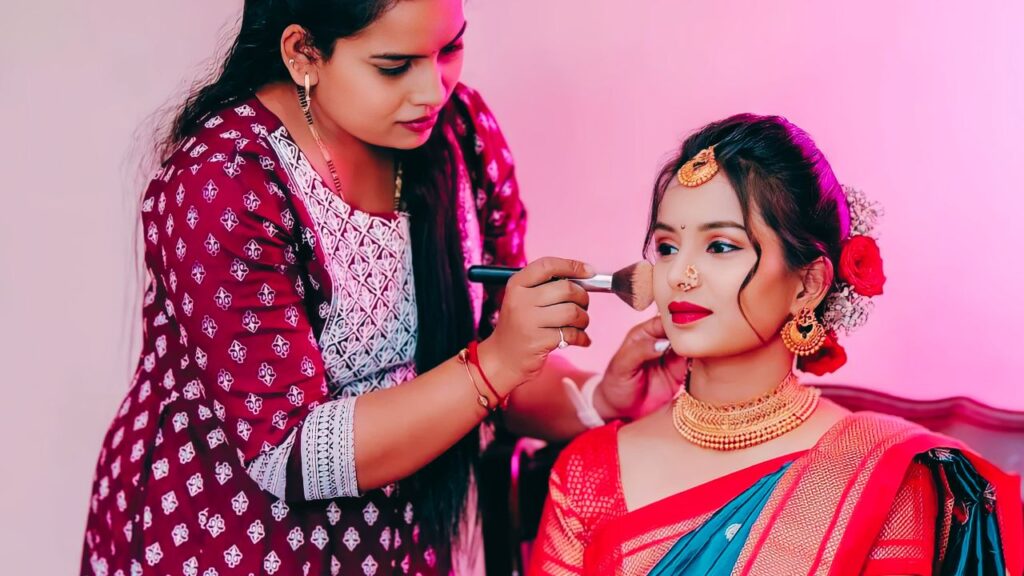
Indian skin is a spectrum of beauty — from golden wheatish to glowing caramel to deep dusky tones. This diversity makes makeup both exciting and challenging. The wrong shade can dull your complexion, but the right one makes you look radiant. The trick is simple: choose shades that complement your undertones and enhance your natural beauty instead of covering it. This guide is your beauty BFF, walking you through foundations, lipsticks, blushes, and pro makeup tips that make you selfie-ready for any occasion. If you’ve ever wondered what truly works as the Best Makeup for Indian Skin, you’ll find the answers here. Why It Matters: Cosmetics & Beauty Trends in India India’s cosmetic market for women was valued at USD 21 billion in 2024 and is projected to soar to USD 79.24 billion by 2033, reflecting a CAGR of 15.9%. Growth is driven by rising beauty awareness, disposable incomes, e-commerce, and social media influence. IMARC Group The broader India beauty & personal care market is worth about US $28 billion (~₹2.43 lakh crore) and is expected to climb to US $34 billion by 2028, thriving at 10–11% annual growth. Makeup sales alone are accelerating—up 15.5%, with skincare at 10.5%. IBEF Within makeup specifically, lip products hold the largest share at 36.78% (2024), while eye makeup is growing fast with an 11.74% CAGR. Online retail drives ~30.61% of sales, growing steadily at an 11.36% CAGR. Mordor Intelligence A striking shift: India’s luxury beauty segment, now around US $800 million, is projected to hit US $4 billion by 2035—a fivefold jump—as global players ramp up local indulgent offerings. Reuters/Kearney Case-in-point: Nykaa, one of India’s leading beauty retailers, saw its Q1 FY25 beauty segment revenue grow by 24%, and profit more than doubled, reaching ₹233 million (~US $2.66 million). Reuters Step 1: Know Your Undertone, Own Your Glow Before you buy makeup, take a moment to identify your undertone. It’s just like choosing wardrobe colors — once you know, everything falls into place. Warm Undertones: Golden, peachy, or yellow tones (common in most Indian skin). Neutral Undertones: A balance of warm and cool — versatile and flattering. Cool Undertones: Pink or blue tones (less common but stunning when styled right). Quick Hack: Look at your wrist veins. Green veins = warm undertone, blue = cool, a mix = neutral. Step 2: Foundation That Actually Matches Your base is your canvas, and nothing ruins the look faster than the wrong foundation shade. Best foundation shades for Indian skin: Golden beige, honey, caramel, almond. Look for words like “warm” or “golden” on the label. Avoid: Foundations with strong pink or grey tones — they can make Indian skin look ashy. Pro Hack: Always test foundation on your jawline, not your hand. Your hands may not match your face tone. Step 3: Conceal + Set = Fresh Face If you’ve got under-eye circles or blemishes, concealer is your best friend. Concealer Choice: 1–2 shades lighter for under the eyes; same skin tone for blemishes. Setting Powder: Banana powders or yellow-based compacts brighten without looking chalky. Step 4: Blush Crush The right blush can make you look naturally radiant. Fair–Medium Skin: Peach, coral, soft pink. Medium–Dusky Skin: Terracotta, rose, plum, warm berry. Deep Dusky Skin: Brick, wine, or deep berry shades. Step 5: Lipsticks That Never Fail Best lipsticks for Indian skin range from everyday nudes to bold festive shades. Nudes: Warm brown, caramel, cinnamon. Everyday Shades: Mauve, peachy nude, rusty orange. Bold Statement Shades: Brick red, maroon, wine, burgundy. Avoid: Chalky pale nudes, as they can wash you out. Step 6: Eyes That Wow Indian eyes are naturally expressive, making eye makeup a real game-changer. Eyeshadows: Gold, bronze, copper, plum, emerald green, navy. Liner: Black, brown, or jewel tones. Mascara: Jet black mascara always defines and opens up the eyes. Step 7: Glow with Highlighter + Bronzer A sun-kissed glow instantly elevates your look. Highlighters for Indian Skin: Champagne, rose gold, warm peach. Bronzers That Work: Terracotta or golden brown for warmth and subtle sculpting. Step 8: Dress It Up for Every Occasion Daily Wear: BB cream, nude lipstick, light blush, mascara. Work Look: Matte base, neutral eyeshadow, brown liner, peachy nude lips. Festive Fun: Full-coverage base, shimmery eyes, bold liner, rich red lips. Bridal Glow: Dewy foundation, gold lids, dramatic lashes, bold lipstick. Makeup Kit Must-Haves Warm-toned foundation Banana powder Blushes (cream + powder) Lipsticks (nude, everyday pink, bold red) Neutral eyeshadow palette with golds and bronzes Champagne highlighter + terracotta bronzer Quick Beauty Tips Always prep with moisturizer and primer. Blend well — harsh lines ruin the look. Test makeup in natural daylight. Choose SPF-infused bases (especially for Indian summers). Keep it subtle for day; save drama for evenings. Blend foundation down to your neck for an even finish. Final Glow-Up ✨ The Best Makeup for Indian Skin is about embracing your natural warmth and richness, not hiding it. Whether it’s a minimal office look or dramatic bridal glam, the right shades and products can transform your face. And if you’re unsure where to begin or need a flawless professional touch for your big day, MakeUrDay makeup artists in Vijayawada is here for you. From everyday looks to stunning bridal transformations, their experts understand Indian skin tones and bring out your best features. Because the ultimate beauty secret? Confidence — and the right artist by your side. That’s why trusting professionals who know the Best Makeup for Indian Skin can be your glow-up shortcut.
How to avoid side effects in cosmetics?
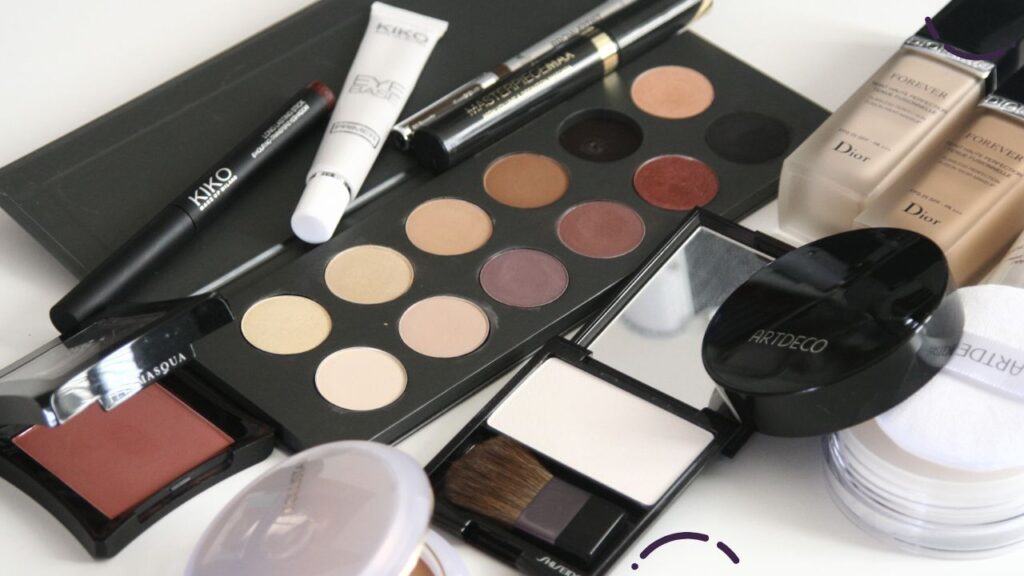
Cosmetics have been an essential aspect of a woman’s life for thousands of years, not only for bridal events but also for everyday use. Women rely on many cosmetic items such as kajal, lipsticks, fairness creams, hair oils, and shampoos as a form of self-care. The beauty industry is massive in India, and it will only continue to grow as time goes on. Companies leave no stone unturned in addressing every cosmetic-related concern, offering glossy products endorsed by celebrities to build trust. Naturally, people are more likely to buy them if someone famous recommends them, and yes, they may even seem effective based on well-known words and reviews from friends or acquaintances. But does that mean they are entirely harmless? No. Many products can, in fact, harm you because they contain harmful chemicals. These chemicals may cause side effects in cosmetics that lead to long-term damage to your skin. Knowing how to avoid cosmetics with harmful chemicals is extremely important—not only to look your best but also to protect your health beyond beauty. Why Should You Be Chemical Free? Most of us have the mentality that “it happened to that person, it can’t happen to me.” We tend to immortalize ourselves, and this mindset can lead to drastic consequences. In a hot climate with high levels of pollution, our skin and hair are already under constant stress. Using harmful chemicals is like adding fuel to the fire—they don’t help and can actually worsen existing damage. Regular use of such chemical-laden products can lead to irritation, pigmentation, premature aging, and even hormone-related issues. Since we live in a developing country, many brands often skirt safety regulations. This is especially true for cheaper local brands that sometimes use banned or unsafe ingredients. This is precisely why you need to be aware and cautious about side effects in cosmetics! Harmful Ingredients Common in Indian Cosmetics Parabens – Preservatives commonly used in skin creams, moisturizers, and lipsticks. They extend shelf life but can disrupt hormones. Avoid names like methylparaben or propylparaben. Phthalates – Found in perfumes, deodorants, and body sprays. They have been linked to reproductive health issues. Sulfates (SLS and SLES) – Common in shampoos, face washes, and even toothpastes to create foam. They strip away natural oils, leaving hair and skin dry. Triclosan – Present in some antibacterial soaps, toothpastes, and deodorants. It may interfere with thyroid function and contribute to antibiotic resistance. Hydroquinone & Mercury – Used in fairness creams and skin-lightening products, despite being banned in several countries. They can damage skin and contribute to kidney damage, neurological problems, memory loss, tremors, and more. Formaldehyde-releasing preservatives – Often found in cheap nail polishes or hair products. They can cause allergies and cancer with prolonged use. Heavy Metals – Detected in products like kajal and lipsticks in India. Unsafe cosmetics may contain arsenic, mercury, and lead, causing skin irritation, allergies, organ damage, neurological problems, and increased cancer risk. How to Avoid These Chemicals? 1. Read the labels in detail. Flip the pack and carefully read the ingredient list. Research unfamiliar names online. 2. Be cautious with skin-lightening products. These are popular in India, especially in the South. We are based in Vijayawada and receive many queries from customers looking for skin lightening. If you get in touch with us, we can help you with makeup and recommend chemical-free products. 3. Ayurvedic branding is attractive, but not always genuine. Look for AYUSH approval to ensure authenticity. 4. When buying perfumes and deodorants, opt for those made with natural essential oils such as rose, lavender, or sandalwood. 5. Buy from companies that promote toxin-free, cruelty-free brands. Examples include Forest Essentials, Kama Ayurveda, Plum, Juicy Chemistry, and Mamaearth. 6. Stay updated with official sources. India’s Bureau of Indian Standards (BIS) regularly publishes updates on banned substances in cosmetics. International tools like EWG’s Skin Deep or apps like Think Dirty can also help check product safety. Conclusion India’s beauty and personal care market is booming, but not all that glitters is gold—or safe. With so many products available, it’s easy to fall for marketing gimmicks without realizing the hidden chemicals inside. By reading labels, avoiding fairness creams with harsh bleaches, choosing certified Ayurvedic or organic brands, and embracing traditional home remedies, you can protect your skin from unnecessary harm. When you are choosing a bridal makeup artist in Vijayawada, MakeUrDay is the best choice. We use products that are safe from the usual side effects in cosmetics. Contact us to get the perfect look—safe and beautiful!
